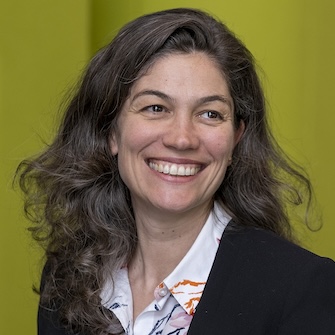ETFA 2024 Keynote Speakers
We are proud to announce the following keynotes to be delivered by distinguished researchers at ETFA 2024.
Keynote by Matthieu Worm
The Industrial Metaverse, more real than real |
|---|
The Industrial Metaverse could be perceived as a buzzword but can equally be seen as the logical next chapter in industrial digitalization. Realizing a space to collaborate and interact with the Digital Twin, supports democratization of complex technology, enabling fast decision-making in engineering and operational challenges. It requires interoperability of heterogeneous virtual models, connectivity to real-world assets and AI for accelerated decision-making. In this talk, Matthieu Worm will present recent advancements in immersive, collaborative and interactive technology, enriching the Digital Twin as we know it.
About Matthieu Worm |
|---|
Matthieu Worm is the technical lead in the Technology Field for Simulation & Digital Twin in Siemens Technology since 2021. He drives consistency and coherency in Siemens’ research and technology roadmap to shape the Industrial Metaverse. He joined Siemens Digital Industries Software in 2016 to develop the simulation and test solutions strategy for the domain of autonomous vehicle development. Before working at Siemens, he was engineering manager at Moog, developing high-end driving simulators and automotive test equipment. Matthieu started his working career at Toyota Motor Europe as vehicle safety engineer. He earned a master’s degree in Industrial Design Engineering at Delft University of Technology and completed an MBA at Antwerp Management School.
Keynote by Dr. Clara Otero Perez
Engineering the Car of the Future in an Evolving Ecosystem |
|---|
The automotive industry ecosystem is undergoing a transformation. The supply crisis has had a significant impact – changing and expanding responsibilities of ecosystem players. At the same time, the shift towards software-defined and electric vehicles has created both opportunities and challenges for automakers. One thing is clear - engineering the car of the future will require collaboration and a new way of thinking. Moving from individual components to scalable system solutions can help optimize resources and accelerate innovation. Join Clara Otero as she shares insights on how the ecosystem evolution is helping shape the future of mobility.
About Dr. Clara Otero Perez |
|---|
Clara has over 25 years of experience in the automotive semiconductor industry, from complex SoCs and software for digital TVs, to wireless payments in mobile phones and radar system for cars. Shortly after she graduated with a Master of Science in Physics by the University of Santiago de Compostela she started working as research scientist at Philips Research Labs in Eindhoven and later continued growing her career at NXP in various leading R&D roles.
Clara was a key driver behind NXP’s company-wide system strategy envisioning, developing and releasing a broad set of automotive system innovations for Electric, Connected and Safe vehicles. Most recently she took over the role as Sr. Director of System Marketing, focusing on software defined electric vehicles closely collaborating with customers to address electrification challenges, increasing efficiency and reuse, extending battery range and lifetime in a safe and secure way. Next to her technical leadership, she has held roles for the Eindhoven Site Management and as a Board Member for NXP’s European Women’s Leadership team.
Keynote by Prof. Giovanni Cherubini
Industry Trends of AI: Opportunities and Challenges |
|---|
The exponential data growth we are witnessing is in large part determined by the emergence of AI-powered big data analytics and Internet of Things. The increasing demand for real-time insights and decision-making support tools drives the development of AI-based analytics platforms that can process large volumes of data in near real time. Furthermore, bridging AI with IoT is a natural option to unleash the data on low-cost and low-power IoT devices, thus boosting many novel applications and services with impressive performance. In this keynote presentation, the challenges that are posed by AI to data storage will be addressed first, with reference to technologies that deliver extreme capacity for highly-scalable, automated data retention. Then the optimization of multi-tier storage systems by reinforcement learning will be discussed. As examples of AI systems that heavily rely on high-capacity storage, deep learning-based recommenders and retrieval-augmented generation for knowledge injection in large language models will be reviewed. Finally, the end-to-end optimization of data allocation in AI-enhanced edge-cloud networks will be considered, where actions are already taken at the edge, thus promoting edge caching and edge intelligence.
About Prof. Giovanni Cherubini |
|---|
Giovanni Cherubini received the Laurea degree, summa cum laude, in 1981 from the University of Padova, Italy, and the M.Sc. and Ph.D. degrees in 1984 and 1986, respectively, from the University of California at San Diego, USA, all in Electrical Engineering. In 1987, he joined the IBM Research Laboratory in Zurich, Switzerland. Since 2023, he is Chief Expert for high-capacity data storage systems at the Huawei Research Center in Zurich. Dr. Cherubini has fostered and managed innovation in several groundbreaking projects in the areas of AI, data storage, control systems, and communication systems.
He is a Life Fellow of the Institute of Electrical and Electronics Engineers (IEEE), a Fellow of the International Federation of Automatic Control (IFAC), a Fellow of the Asia-Pacific Artificial Intelligence Association (AAIA), and a former IBM Master Inventor. Among other recognitions, he received the 2021 IEEE Control Systems Society Transition to Practice Award for inventing and developing advanced control technologies for magnetic tape data storage products. His current interests include advanced cloud storage technologies, neuromorphic computing, and in-memory high-dimensional computing for AI applications.



